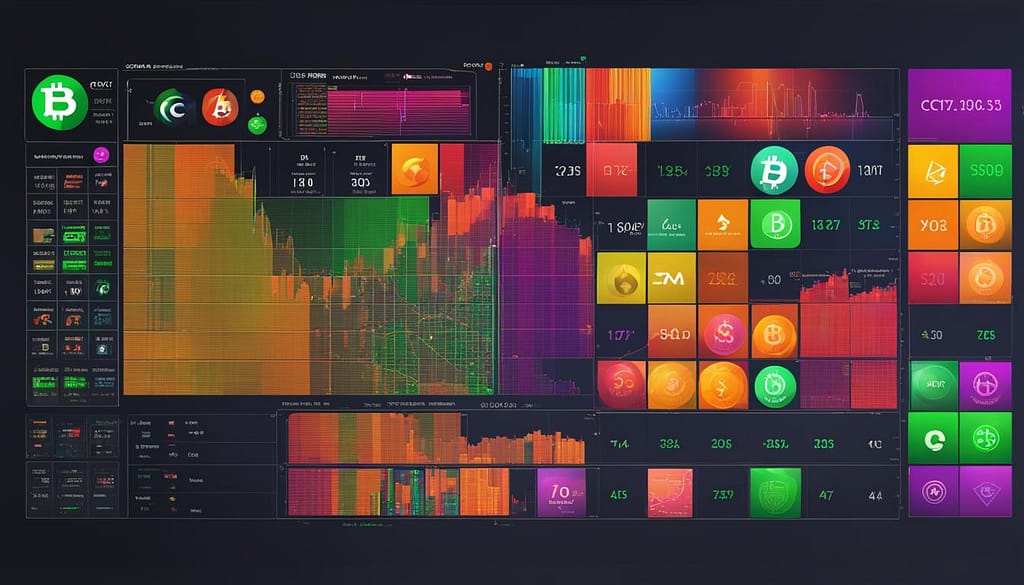What is Bitcoin Cash?
Seeking to navigate the bustling realm of cryptocurrencies, individuals and investors alike turn their attention towards Bitcoin Cash, a digital currency that facilitates the immediate necessity for efficient and inexpensive digital transactions. As an altcoin created through a hard fork from the Bitcoin protocol, Bitcoin Cash has rapidly claimed its territory as a viable alternative to its predecessor by addressing concerns around transaction speeds and costs. By adopting greater block sizes within its blockchain technology, it aims to reinvent the accessibility and ease of conducting business on a global scale without cumbersome fees or lagging processing times.
While it shares the same foundational principles as Bitcoin, Bitcoin Cash aims to crystallize the original intention of cryptocurrencies – to serve as fluid, digital cash that one can employ peer-to-peer. The evolution of this cryptocurrency represents not just a shift in technology, but also a philosophical divergence for users seeking sovereignty from traditional financial systems. As a result, Bitcoin Cash is not simply another cryptocurrency; it is a stakeholder in the future blueprint of decentralized financial exchange.
Key Takeaways
- Bitcoin Cash is a dynamic cryptocurrency designed to provide rapid and cost-effective transactions.
- Emergence from a hard fork indicates its direct lineage and technological similarities with Bitcoin, yet with distinctive improvements.
- With a focus on large block sizes, Bitcoin Cash enhances the scalability issues faced by the original Bitcoin network.
- The currency embodies the primary attributes of digital currency, aiming to optimize peer-to-peer transactions without the need for intermediaries.
- Bitcoin Cash’s commitment to a fixed supply echoes the principles of deflationary assets, setting a standard in the blockchain technology landscape.
- As an altcoin, Bitcoin Cash underscores a progressive step in diversifying and strengthening the cryptocurrency market.
Introduction to Bitcoin Cash: A Peer-to-Peer Digital Currency
The advent of Bitcoin Cash marked a revolutionary moment in the realm of cryptocurrency, setting the stage for a new era of financial innovation. Rooted in the belief of a payments system accessible to all, Bitcoin Cash evolved from a shared desire to sustain the quintessential ethos of decentralized finance. Here is an exploration into the inception of Bitcoin Cash and how it became the embodiment of peer-to-peer transactions.
Origins of Bitcoin Cash and the Philosophy Behind Its Creation
In a landscape dominated by traditional finance, the call for a decentralized alternative became pervasive among early cryptocurrency enthusiasts. Conceived from a divergence in vision within the Bitcoin community, Bitcoin Cash crystallized as a response to Bitcoin’s growing constraints. Advocates of Bitcoin Cash yearned for a digital currency that upheld the ability to process transactions efficiently, true to the core philosophy of peer-to-peer transactions laid out by the original whitepaper of Bitcoin.
The sole intent driving the inception of Bitcoin Cash was to rejuvenate the potential of cryptocurrencies as a functionally viable daily transaction medium. This commitment to improving user experience and accessibility became a guiding principle in the conceptualization of Bitcoin Cash, positioning it at the forefront of the conversation on financial innovation.
Understanding the Hard Fork: Splitting From Bitcoin
The technical manifestation of this goal was realized through what is known as a hard fork. In mid-2017, the Bitcoin blockchain underwent a poignant transformation, catalyzed by the active pursuit of a more robust and scalable system. At the heart of the hard fork was the intent to enhance Bitcoin’s functional capacity, addressing the scaling debate head-on by incrementing the block size notably—from the then standard 1MB to an initial 8MB. This pivotal decision endorsed a clear path for expanding transaction volumes and signaled a watershed event in Bitcoin Cash origins.
| Characteristic | Bitcoin (pre-fork) | Bitcoin Cash (post-fork) |
|---|---|---|
| Block Size Limit | 1MB | 8MB |
| Scalability Focus | Limited | High priority on increased transaction throughput |
| Underlying Philosophy | Store of value | Peer-to-peer electronic cash |
| Financial Innovation | Conservative Approach | Emphasis on functional improvements and user adoption |
The introduction of Bitcoin Cash was thus a critical juncture, not just for those directly involved in the split, but for the broader narrative of decentralized finance. It underscored a collective determination to refine and advance the ideals of cryptocurrency, ensuring its promise of autonomy and peer-to-peer empowerment remained intact for future generations.
Comparing Bitcoin Cash with Traditional Banking
The inception of Bitcoin Cash spearheaded an alternative financial narrative, diverging from the traditional banking systems that have dominated for centuries. Unlike the conventional framework, where sovereign control over funds is often compromised via restrictions imposed by financial institutions, Bitcoin Cash fosters an ecosystem of unrestricted peer-to-peer transactions. This paradigm shift represents a movement towards a more democratized monetary landscape, where users maintain full custody over their assets.
Traditional banking systems come with an array of operational caveats that may affect the user’s access to and control over their own money. Historical precedents in countries such as Cyprus and Greece have highlighted vulnerabilities where account holder funds were frozen, demonstrating cases where individual’s financial autonomy was forcefully relinquished. In stark contrast, Bitcoin Cash ensures that the individual has the ultimate say over their funds, capacitating global transactions unrestricted by time or geography.
Moreover, the less tangible but often crucial privileges—such as privacy and financial inclusivity—are inherent benefits provided by this emerging digital currency. Where traditional financial infrastructures might penalize or marginalize certain demographics, Bitcoin Cash offers an egalitarian platform, open to anyone regardless of socio-economic standing.
| Characteristic | Traditional Banking | Bitcoin Cash |
|---|---|---|
| Fund Control | Subject to institutional policies | User sovereignty |
| Transaction Availability | Limited by bank hours/geographical boundaries | 24/7 Globally |
| Transactional Privacy | Subject to KYC/AML regulations | Enhanced user privacy |
| Fees | Often high due to intermediaries | Minimized costs |
| Chargeback Risk | Significant and costly | Rare and typically user-directed |
The costly fees, potential for unnecessary chargebacks, and latency in transactions that commonly plague traditional banking engagements are vastly reduced within Bitcoin Cash’s framework. These distinctive facets of Bitcoin Cash not only ensure a swift and affordable means of conducting transactions but also echo the original intent of creating a decentralized, efficient financial system that empowers its users, validating Bitcoin Cash’s place in the modern financial narrative.
The Technological Foundations of Bitcoin Cash
Striving to realize the vision of peer-to-peer electronic cash, Bitcoin Cash is anchored on revolutionary blockchain technology. This technology is not just the backbone of Bitcoin Cash but also a testimony to the power of decentralization in modern digital currencies. The distinction of Bitcoin Cash lies in its technical design, which aims to offer better scalability and an efficient transactional process.
Blockchain Technology and Decentralization
At the heart of Bitcoin Cash is a robust and transparent ledger system made possible by blockchain technology. Unlike traditional financial systems, where central authorities exert significant influence, Bitcoin Cash’s decentralized network ensures that no singular power can dominate. Each transaction is validated by a network of users, guaranteeing autonomy and resilience against interference.
The Importance of a Fixed Supply Currency
As a fixed supply currency, Bitcoin Cash echoes the attributes of commodities like gold which are inherently scarce. This digital scarcity is critical in a world where traditional money can be devalued through inflation. Bitcoin Cash limits its supply to 21 million coins, providing a safeguard against depreciation and underscoring its value proposition in the realm of digital currency.
| Feature | Function | Benefit |
|---|---|---|
| Decentralized Ledger | Records all transactions across a network of computers | Increases security and reduces risk of fraudulent activities |
| Fixed Supply | Limits the number of coins to 21 million | Creates scarcity, potentially enhancing value over time |
| Peer-to-peer Transactions | Enables direct exchanges without intermediaries | Reduces transaction costs and increases efficiency |
Employing the groundbreaking Bitcoin Cash technology, users worldwide are empowered to transact seamlessly, harnessing a transparent, decentralized platform that stands firm against the volatility often found in fiat currencies. It’s this blend of innovation and practicality that fuels the growing adoption of Bitcoin Cash as a reliable and forward-looking digital currency.
Bitcoin Cash’s Unique Selling Propositions: Features and Benefits
Delving into the realm of digital currency, Bitcoin Cash emerges as a formidable competitor with its distinctive value offerings. These go beyond mere technological advancements, offering financial benefits and sovereignty through an accessible peer-to-peer network.
Speed and Cost: Advantages Over Conventional Payment Systems
One of the primary attractions of Bitcoin Cash is its exceptional efficiency in processing transactions. Breaking away from the constraints of traditional financial channels, Bitcoin Cash introduces an age of economic agility where speed and cost convergence is a reality. By substantially reducing the friction in transaction times and costs, Bitcoin Cash provides users with seamless financial experiences in their day-to-day exchanges.
The following table details the comparative advantages Bitcoin Cash offers in relation to conventional payment systems:
| Parameter | Bitcoin Cash | Traditional Banking |
|---|---|---|
| Transaction Fee | Negligible (often less than $0.01) | Varies (often significant, especially for international transactions) |
| Transaction Speed | Minutes | Can take days |
| Accessibility | 24/7 and global | Limited by banking hours and locations |
| Financial Sovereignty | Complete user control | Subject to bank policies and regulations |
Financial Sovereignty: Be Your Own Bank
The ethos of decentralized finance is embodied in the way Bitcoin Cash fosters financial sovereignty. By empowering individuals to “be their own bank,” Bitcoin Cash dismantles traditional dependencies and intermediaries in monetary matters. Users gain unparalleled control over their assets, unshackled by institutional oversight – a hallmark of true financial independence in the age of digital currencies.
Bitcoin Cash stands as a bastion of autonomy within the burgeoning sector of decentralized finance, offering a secure harbor of financial liberty for individuals around the world.
In an effort to highlight the profound impact of Bitcoin Cash, we consider its operational mechanics within the purview of a decentralized network, the very bedrock that has continuously propelled peer-to-peer transactions to the forefront of financial discourse.
This disruptive technology pledges not only to redefine our engagement with money but also to reimagine a future where economic empowerment and efficiency coalesce. As the blockchain landscape evolves, Bitcoin Cash secures its position as an innovation driver, leveraging its unique selling propositions to uphold its promise of speed, cost efficiency, and financial sovereignty.
Mechanics of Bitcoin Cash Transactions: An In-Depth Look
Understanding the intricacies of Bitcoin Cash transactions is essential for anyone invested in the crypto market. These transactions are a testament to the power of blockchain technology, which upholds a decentralized system free from traditional financial institution controls. Leveraging larger block sizes compared to Bitcoin, Bitcoin Cash provides a scalable solution that aligns with the fast-paced demand for virtual money.
Each transaction on the Bitcoin Cash network is meticulously verified and recorded in a block, which is then added to the blockchain. This process ensures that every transfer of virtual money is immutable and transparent, building trust within the system. Below is a breakdown of how a typical Bitcoin Cash transaction flows from inception to completion:
- Initiation: A user begins the transaction by signing it with their private key, authorizing the transfer of Bitcoin Cash.
- Verification: Network nodes verify the transaction details, including the validation of the digital signature.
- Block Formation: Once verified, the transaction is grouped with others into a candidate block.
- Mining: Miners compete to validate the block by solving a cryptographic puzzle, essential for maintaining the network’s security and integrity.
- Confirmation: Upon solving the puzzle, the block is added to the blockchain, providing confirmation to the involved parties.
- Completion: The transaction is now complete, and the Bitcoin Cash amount adjusts in the digital wallets of both the sender and receiver.
Through this process, Bitcoin Cash’s capabilities in handling a larger capacity of transactions within a 32MB block size become clear. This advancement addresses scalability issues that have been a contention point for Bitcoin, thereby cementing Bitcoin Cash as a practical and efficient medium for online transactions in today’s digital economy.
An Analysis of Bitcoin Cash’s Market Position and Crypto Market Dynamics
Within the broad spectrum of the cryptocurrency world, Bitcoin Cash has carved out a distinct niche. Its enhanced capacity for facilitating quick peer-to-peer transactions demonstrates not only utility but also a commitment to the philosophies that sparked the creation of digital currencies. In this analysis, we will delve into the particularities that define Bitcoin Cash’s market position and its responsiveness to the ever-shifting crypto market dynamics.
Bitcoin Cash in the Crypto Ecosystem
Bitcoin Cash’s influence on the cryptocurrency ecosystem is substantial, with its market performance showcasing a blend of pioneering tech and enticing investment potential. Capturing a considerable share of the market capitalization pie, Bitcoin Cash stands as one of the preferred choices among investors and users needing a reliable means for digital exchange.
The adeptness of Bitcoin Cash to conduct secure, swift transactions without intermediaries makes it a staple in the sphere of cryptocurrencies. Its commitment to expand and uphold Satoshi Nakamoto’s original vision imbues it with a credibility that appeals to traditionalists and newcomers alike.
Investment Potential: Market Performance Insights
As an asset class, Bitcoin Cash offers an intriguing investment avenue characterized by volatility synonymous with the cryptocurrency market. Despite the fluctuations, the fundamental aspects such as increased block size and a focus on scalability embroider Bitcoin Cash with a veneer of promising investing potential.
Fostering both adoption and adaptation, its market performance is often a reflection of investor sentiment towards practical cryptocurrencies and the broader financial technology landscape. With an enduring presence and progressive technical development, Bitcoin Cash represents not just a transactional tool, but a speculative investment with the capacity to yield considerable returns.
How Bitcoin Cash Supports Decentralized Finance and Innovation
As a foundational pillar in the advancement of decentralized finance (DeFi), Bitcoin Cash stands at the forefront of financial innovation. Its commitment to fostering a flexible and inclusive token ecosystem allows it to integrate seamlessly with existing and emerging blockchain projects. This blossoming synergy is embodied in the very principles of Bitcoin Cash integration with various DeFi applications, driving progress in blockchain technology and opening up new financial paradigms.
Token Ecosystem and Its Integration with Bitcoin Cash
The symbiotic relationship between Bitcoin Cash and the expansive token ecosystem is pivotal to realizing the full potential of blockchain assets. By enabling the creation and exchange of custom tokens, Bitcoin Cash nurtures an environment where assets and digital representations of real-world commodities can be traded with unprecedented efficiency and transparency.
This versatility is illustrated in the table below, demonstrating Bitcoin Cash’s contribution to DeFi protocols:
| Feature | Description | Benefit |
|---|---|---|
| Custom Token Creation | Capability to generate unique tokens on Bitcoin Cash blockchain. | Empowers financial innovation and asset variety. |
| Simplified Transactions | Enhanced transaction methods specific to the token’s functionality within the ecosystem. | Facilitates seamless and cost-efficient trade. |
| Democratic Consensus | A consensus mechanism that upholds token integrity and network security. | Ensures a reliable and trustworthy system. |
| Interoperability with DeFi | Integration with various DeFi applications and services. | Increases accessibility for users and utility of tokens. |
| Liquidity Provision | Facilitation of liquidity pools involving Bitcoin Cash-based tokens. | Enhanced asset liquidity supporting a dynamic market. |
Fostering a New Era of Financial Systems
Bitcoin Cash is a vibrant contributor to a new epoch of financial systems, one where autonomy, efficiency, and inclusivity are the benchmark. With DeFi platforms leveraging the robust nature of Bitcoin Cash’s infrastructure, participants engage in financial activities that were previously restrictive or inaccessible.
The decentralization intrinsic to Bitcoin Cash echoes the financial independence sought by users worldwide, disrupting traditional financial models and championing a system rooted in equitable opportunity. It propels us towards an era where financial transactions are characterized not by their intermediaries, but by the empowerment of each individual having direct control over their economic destiny.
Merchant Adoption of Bitcoin Cash: A Business Perspective
The integration of Bitcoin Cash as a payment method is a strategic move for businesses aiming to leverage the advantages of blockchain technology. The utilisation of Bitcoin Cash brings forth merchant adoption on multiple fronts—reducing operational costs, curtailing fraudulent chargebacks, and accessing a broader crypto-literate customer base. As the landscape of crypto payments evolves, businesses adopting Bitcoin Cash position themselves at the forefront of this financial transformation.
Merchant adoption of Bitcoin Cash reflects a forward-thinking business perspective by recognizing the potential to streamline and secure transactions. With Bitcoin Cash, companies are not only embracing the shift towards digital currency but are also exploiting a system that offers fast, transparent, and cost-effective transactions.
| Benefits of Bitcoin Cash | Traditional Payment Systems |
|---|---|
| Negligible transaction fees | Higher processing fees |
| No chargebacks | Risk of chargebacks and fraud |
| Quick and irreversible transactions | Transaction delays and reversals |
| Attracting crypto-savvy customers | Limited to traditional consumer base |
| Marketing opportunities through crypto directories | Conventional marketing channels |
From crypto payments facilitated by blockchain technology to the cultural shift towards digital currencies, the benefits of Bitcoin Cash are convincing more merchants to adopt this innovative payment system. It is becoming increasingly evident that the integration of Bitcoin Cash offers a significant competitive edge for businesses willing to advance into the digital currency space.
The Evolution of Bitcoin Cash: Key Historical Milestones
Reflecting upon the transformative journey of Bitcoin Cash, one cannot overlook the significant historical milestones that have shaped its path within the digital currency market. Embracing Satoshi Nakamoto’s vision, Bitcoin Cash has consistently sought scalability solutions to enhance its functionality as an efficient peer-to-peer cash system.
The Vision of Satoshi Nakamoto and its Realization
The inception of Bitcoin Cash was rooted in a quest to realize Satoshi Nakamoto’s original intent of creating a scalable digital currency. Its emergence can be directly linked to these ambitions, seeking to throughway transaction bottlenecks while maintaining the decentralized ethos that first defined Bitcoin.
Assessing Bitcoin Cash’s Scalability Solutions Over Time
Over the years, Bitcoin Cash has addressed scalability head-on, with the community working diligently to manage its growth and capacity. Enhancements such as increased block sizes have been pivotal, presenting an evolutionary leap from the mere 8MB of its infancy to the robust 32MB blocks of today.
| Date | Historical Milestone | Impact on Scalability |
|---|---|---|
| August 2017 | Official launch of Bitcoin Cash | Introduction of 8MB block size to improve transaction volume |
| May 2018 | Network upgrade | Increase to 32MB block size, pushing the boundary for scalability |
| November 2018 | Bitcoin Cash hard fork | Birth of Bitcoin SV to further address scalability but distinct from BCH ethos |
The table encapsulates not only the upgrades but also the forks and refinements that have marked Bitcoin Cash’s evolution. A closer examination of these modifications highlights the digital currency’s commitment to remaining aligned with the progression of the digital currency market, all the while upholding the core principles laid out by Satoshi Nakamoto.
Supporting the Network: Bitcoin Cash Development and Community
The growth and sustainability of Bitcoin Cash are critically tied to its robust ecosystem driven by impassioned individuals and independent entities. The collaboration within this space accentuates the decentralized ethos of this digital currency and ensures a diverse range of thought and development.
The Role of Independent Development Teams
At the heart of the Bitcoin Cash decentralized network are the independent development teams working tirelessly to enhance protocol and network functionality. These teams, such as Bitcoin ABC, BCHD, and Bitcoin Unlimited, play a pivotal role in the open-source nature of Bitcoin Cash, bringing forth innovations designed to align with the global vision of a practical digital cash system. They stand at the forefront of Bitcoin Cash development, contributing to a decentralized infrastructure free from monopolistic control.
Community Initiatives and Supporting Global Adoption
Support for global adoption of Bitcoin Cash isn’t limited to technological advancements alone. The currency has seen a wave of community initiatives aimed at increasing its utility across the globe. From educational resources to fostering merchant adoption, these initiatives create a more accessible and inclusive financial system. Organizations that contribute to this mission include the Bitcoin Cash Association and local meet-up groups, which collectively drive awareness and adoption.
Besides these efforts, the community places a strong emphasis on making Bitcoin Cash accessible to non-English speakers through translation projects. This inclusivity brings Bitcoin Cash not only to those in technologically advanced regions but also to those in developing economies who might benefit the most from a peer-to-peer, feeless, digital payment system.
| Development Teams | Contributions | Community Impact |
|---|---|---|
| Bitcoin ABC | Core software maintenance | Ensures a stable and secure network |
| BCHD | High-performance blockchain services | Provides scalability and efficient user experiences |
| Bitcoin Unlimited | Research and development of flexible block sizes | Advocates for on-chain scalability |
| Bitcoin Cash Association | Promotion and community engagement | Spurs global adoption and attracts new users |
Collectively, these independent development teams and community facilitators reinforce the strength of Bitcoin Cash. They bring to life the vision of a scalable, efficient, and user-centric currency that transcends borders, creating a truly decentralized network.
Conclusion
As Bitcoin Cash carves its place within the ever-expansive realm of cryptocurrency and blockchain technology, speculations about its trajectory remain rife with potentials and pitfalls. This digital frontrunner has made significant strides in championing the philosophy of decentralized finance, offering a robust alternative for peer-to-peer transactions and embodying the digital payments systems of tomorrow. With our gaze firmly set on the horizon, the future of Bitcoin Cash seems studded with possibilities, resonating with users who applaud the autonomy and efficiency it heralds.
Reflecting on the Future of Bitcoin Cash
The mosaic of digital currencies is continuously shifting, and Bitcoin Cash’s role as a compelling actor cannot be underestimated. Promising advancements chart the roadmap ahead, each stride bringing with it the anticipation of greater integration and adoption across global payment networks. The ethos of a decentralized monetary system it embodies serves not only as a crucible for financial innovation but as a beacon for a future where digital cash mirrors the fluidity and accessibility of information in our digital age.
Exercising Caution: Volatility and Risks in the Crypto World
Yet, amid these promising developments, the shadows cast by crypto world volatility and various risks loom large. The oscillations in valuation, regulatory uncertainties, and technological complexities present challenges that demand vigilance. Investors and users alike must navigate these waters with prudence, arming themselves with knowledge and a stratum of skepticism when necessary. No new frontier was ever conquered without risk, and for Bitcoin Cash and its contemporaries in the sphere of decentralized finance, the path forward is no exception.
FAQ
What is Bitcoin Cash?
What led to the creation of Bitcoin Cash?
How does Bitcoin Cash compare to traditional banking systems?
What technological foundations support Bitcoin Cash?
What are the unique selling propositions of Bitcoin Cash?
How do Bitcoin Cash transactions work?
What is Bitcoin Cash’s position in the crypto ecosystem?
In what ways does Bitcoin Cash support decentralized finance and innovation?
Why should merchants consider adopting Bitcoin Cash?
How has Bitcoin Cash evolved since its inception?
Who is behind the development and support of Bitcoin Cash?
What should individuals consider before engaging with Bitcoin Cash?
Source Links
- https://www.investopedia.com/terms/b/bitcoin-cash.asp
- https://www.investopedia.com/tech/bitcoin-vs-bitcoin-cash-whats-difference/
- https://bitcoincash.org/










